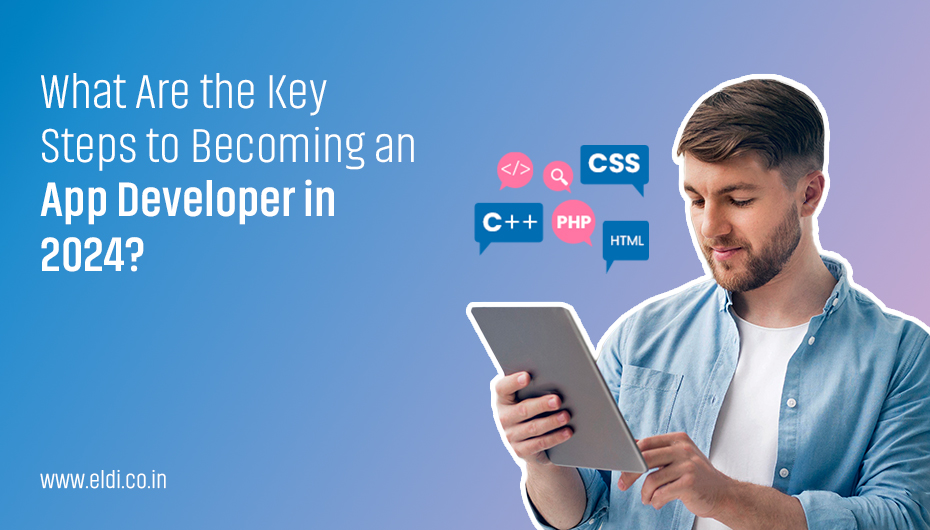
Get in Touch
- 1 How to start developing a mobile application?
- 1.1 Choose a Mobile Platform
- 1.2 Learn Programming Languages
- 1.3 Learn Mobile App Development Concepts
- 1.4 Get Acquainted with the Development Tools
- 1.5 Think about Education and Certification
- 1.6 Develop a portfolio of projects
- 1.7 Learn About App Distribution
- 1.8 Gain Work Experience
- 1.9 Specialize as well as develop different/new abilities
- 2 Why do businesses need a mobile app?
- 2.1 Increased Accessibility and Convenience
- 2.2 Improved Customer Interaction and Communication
- 2.3 Brand Visibility and Recognition
- 2.4 Better Satisfaction for Consumers
- 3 Conclusion
Mobile apps have become a pivotal aspect of almost everything nowadays – from social networking to shopping and entertainment.
Researchers say that app downloads came to approximately 77 billion in the early half of 2024 alone (Source: appmysite).
The increasing demand for fresh and innovative applications has made it an exciting chance for anyone who loves technology and creative skills and wants to become a mobile app developer.
This blog serves as a simple guide and a stepping stone in your journey toward being a mobile app developer under an Android development course.
We will discuss all the basics such as platform selections (iOS or Android), required programming languages, and user interface design concepts.
How to start developing a mobile application?
Choose a Mobile Platform
- iOS
Originally developed by Apple, iOS apps are written in languages such as Swift and Objective-C.
- Android
Android apps, which are commonly created by Google, are generally coded using Java or Kotlin.
- Cross-Platform
Some developers prefer to use frameworks such as React Native, Flutter, and Xamarin which enable the creation of apps for both iOS and Android.
Learn Programming Languages
- Swift and Objective-C
Swift is the modern language used for iOS development while Objective-C is older but still commonly utilised.
- Java and Kotlin
In Android development, while Java is the traditional language, there has been a shift towards Kotlin, mainly because of its concise nature and safety.
- JavaScript, Dart, C#
When it comes to developing applications for multiple platforms, React Native uses JavaScript, Flutter uses Dart, while Xamarin uses C#.
Learn Mobile App Development Concepts
- UI/UX Design
Understand what User Interface (UI) and User Experience (UX) are. Know how to easily navigate through them when designing websites that are user-friendly and good-looking as well.
- APIs and Backend Development
Find out how to integrate apps with servers, databases, and other services using APIs. It can be helpful to know backend development as well as cloud services.
- Version Control
Learn more about version control systems such as Git that are used widely for collaboration and tracking of code changes.
Get Acquainted with the Development Tools
- Integrated Development Environments (IDEs)
Xcode for iOS, Android Studio for Android, and Visual Studio for cross-platform development.
- Emulators and Simulators
These tools let you test your apps on emulators, i.e., on ‘dummy’ devices with different screens and OSs.
- Debugging and Testing Tools
Understand how to debug your apps and test them to detect when something is wrong or if it does not operate across different devices.
Think about Education and Certification
- Degree Programs
Some courses such as mobile app development courses can be beneficial for the job.
- Online Courses and Bootcamps
Today, many places provide courses like Flutter Training Institute Ahmedabad related to mobile app development.
- Certification
Formal certifications from recognized platforms or companies such as a 15-day internship in Ahmedabad can add to your resume.
Develop a portfolio of projects
- Create Simple Apps
Work on small projects first to sharpen your skills. Some ideas include developing simple applications such as calculators to-do lists or games.
- Contribute to Open Source
Participating in open-source projects through various channels such as GitHub can be beneficial in terms of experience and visibility.
- Develop Personal or Client Projects
Developing projects for oneself or clients may help improve one’s portfolio and showcase one’s skills.
Learn About App Distribution
- App Store and Google Play
Learn about the procedures of submitting apps to the Apple App Store and Google Play Store – their guidelines, certification, and marketing.
- App Monetization
Consider upgrading your app with revenue-generating models such as in-app purchases, subscriptions, advertisements, or paid apps.
Gain Work Experience
- Internships
Internships such as 15 Days internship in Ahmedabad can offer practical working experience and environment as well as an insight into the actual development environments.
- Freelancing
Freelancing can also contribute to your portfolio and you might be able to work with various clients and projects.
- Employment
Focus on acquiring work experience under an IT course in Ahmedabad by applying for regular positions in companies that specialize in mobile application development.
Specialize as well as develop different/new abilities
- Specialization
It is important to specialize in areas such as gaming, e-commerce, health apps or enterprise apps.
- Expand Skills
Expand your knowledge about related fields like UI/UX design, cloud solutions, and AR/VR to improve your background in app development.
Why do businesses need a mobile app?
Increased Accessibility and Convenience
- Mobile-first World
Today in a world where almost everyone owns a smart device mobile application, businesses can communicate directly with the client. Apps could be conveniently downloaded from any platform and used at any time anywhere thus increasing usability.
- Offline Access
As opposed to websites, most apps provide offline operation, meaning the user can interact with content and features even without an Internet connection.
Improved Customer Interaction and Communication
- Push Notifications
An app can also send push notifications to users to notify them of its updates, new features, promotions, and other news. This can enhance user engagement and prompt users to take action.
- Personalization
Apps can target client experiences depending on the client’s behavior, preferences, and geographic location, making the experiences interactive.
Brand Visibility and Recognition
- Brand Presence
An app developed under IOS Institute Ahmedabad also helps to create a better-branded environment for the user on their device. A branded app has a constant presence on the user’s smartphone screen hence constantly reminding the user of the brand.
- Custom Branding
Brands get the chance to develop an exclusive application with individual design widgets that showcase the company’s brand image.
Better Satisfaction for Consumers
- Instant Access
Mobile applications can easily allow users to access customer support, general information, or any other information that can help enhance the experience.
- Integration with Support Systems
Incorporation with chatbot, live, and other support systems provides smooth support through the apps.
Conclusion
As you move forward, keep in mind that mobile app development is always changing.
Regardless if you are developing for iOS, Android, or cross-platform programs, programming techniques, design principles and standards in app production should be always considered.
Follow current fashions and technological changes and don’t be afraid to enroll in a mobile development course In Ahmedabad when needed.
You can develop effective cell phone apps by constantly learning new things, conducting several tests, and having an assorted range of projects in your portfolio.
Dedication and love for the work, will lead you towards making applications that are impactful and loved by users from all over the world and let you have fun while programming! For more information or any inquiries, please contact us.


